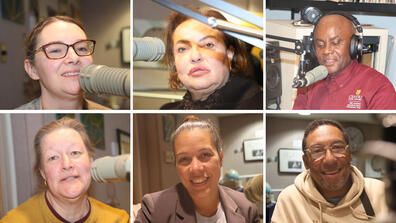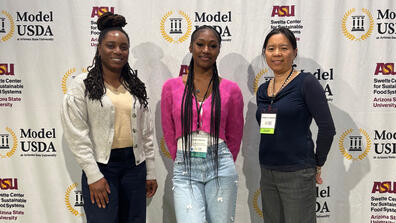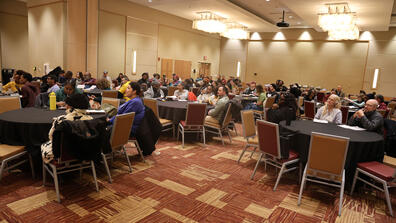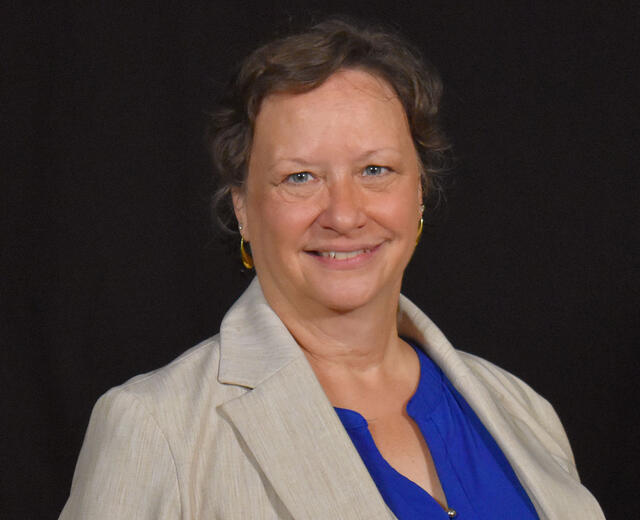
Strength in science, heart in service: Dr. Kathleen Carter and the rise of Exercise Science
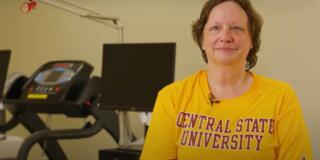
At Central State University, where tradition meets innovation, the Department of Agriculture and Life Sciences is home to a rapidly growing and purpose-driven Exercise Science program.
Spearheaded by department chairperson Dr. Kathleen Carter — educator, researcher, and steadfast student mentor — the program exemplifies the University’s commitment to excellence, opportunity, and holistic student development.
From dietetics to doctorate: A journey of purpose

Dr. Carter’s path to Central State wasn’t linear — it was inspired. She began her career in nutrition, earning her undergraduate degree and working as a registered dietitian in a long-term care facility. But what she observed there reshaped her vision: many of her patients were there due to preventable, lifestyle-related health issues.
“I had the nutrition part,” she recalled. “But I didn’t have the exercise part.”
That realization propelled her to earn a master’s degree in Exercise Science, which led to what she describes as her “dream job” — running a hospital-based fitness center. There, she supported individuals on their wellness journeys, combining meal planning with physical activity, and witnessing firsthand how a holistic approach could change lives.
Later, driven by a desire to work with individuals with intellectual disabilities, she returned to school for her Ph.D. and launched a groundbreaking adapted physical activity program for children at the University of Louisville.
Family needs eventually brought her back to Ohio. And in 2018, Dr. Carter joined Central State University with a mission: to build an Exercise Science program that prepares students not just for careers, but for lifelong impact.
Building a program with purpose
When the program launched in 2018, Dr. Carter quickly recognized that its curriculum needed realignment. Over the next several years, she worked diligently to revamp the structure, ensuring it aligned with national standards and included a strong foundation in both science and application.
Today, CSU’s Exercise Science program offers two distinct tracks:
- Sports performance track: Designed for students interested in athletic coaching, training, sports management, and entrepreneurial ventures.
- Clinical track: Prepares students for competitive graduate programs, including physical therapy (PT), occupational therapy (OT), physician assistant (PA), medical school, and other allied health careers.
What distinguishes Central State’s program, Dr. Carter explains, is its intentional design and student-focused faculty. Alongside Dr. Brandy Phipps, a nutrition expert, and Earnest Washington, a practitioner with real-world coaching experience, the trio brings science, strategy, and soul to every classroom.
“We’ve built something special,” Dr. Carter said. “Our students know the ‘why’ from the science and the ‘how’ from hands-on learning.”
More than a degree: A launchpad for leaders
Graduates from the Exercise Science program leave CSU with more than a diploma — they leave with clarity, confidence, and direction. The program boasts a growing list of success stories:
- Students admitted to top graduate programs — many with full assistantships.
- Alumni who’ve launched gyms, coached high school teams, or entered fields like occupational therapy, nursing, and exercise physiology.
- Placement in roles through Central State University Extension and YMCA partnerships, where they lead health education and fitness programming in the community.
“I always tell families: this is a springboard degree,” Dr. Carter said.
“It can take you into so many fields depending on your interests.”
And for those who aren’t sure where they want to go, Dr. Carter and her colleagues help them explore their options — with open conversations, encouragement, and a dose of real talk.
Hands-on, minds-on learning
Central State’s Exercise Science students don’t just study — they apply. One of the program’s signature efforts is the Healthy Athlete Research Project, an evolving, student-led initiative that began by tracking performance and wellness metrics for student-athletes. Students like Ibrahima Jarjou, Tumani Wahab, and Ozzie Jordan have helped collect data on strength, flexibility, body composition, nutrition, and stress — all to understand and improve athlete health.
The students presented their research titled “Art or Athlete” at the American College of Sports Medicine International Conference in Atlanta, Georgia, in May. The research compared the lung capacity of track and field athletes with that of the marching band members to determine which, if either group, had greater lung function due to exercise.
Now in its second year, the project is entering the intervention phase, with Dr. Carter and her students implementing individualized nutritional strategies and planning for deeper assessments in sleep, hormones, and stress response.
Other research initiatives include:
- Biomechanics in agriculture: Using motion capture to prevent repetitive-use injuries in beekeepers and small farmers.
- Horticulture therapy: A collaborative project with Counseling Services and Social Work and Agriculture faculty to promote mental health through nature-based interventions.
- Fall 2025 Health Fair: A student-planned, campuswide event featuring screenings, classes like yoga and Zumba, and wellness education for the entire CSU and Wilberforce communities.
“We want students to work with a variety of populations,” Dr. Carter explained. “Not just athletes, but older adults, individuals with chronic conditions, and community members with diverse needs.”
A community of care
Dr. Carter’s leadership style is grounded in mentorship and care. She sees her students not just as learners, but as future colleagues and changemakers. Whether she’s calling a student to ensure they wake up for class, talking them through career doubts, or helping them navigate pressure from home, her commitment goes beyond the classroom.
“What would I have needed at their age? That’s what I try to give them,” she reflected.
Alongside Washington, who brings a “dad talk” level of accountability, and a close-knit department team, Dr. Carter fosters an environment where students are known, supported, and expected to excel.
Her mentorship isn’t lost on students. Jarjou described her as “supportive and inspiring,” and credits her guidance with helping him discover his true path — one that’s evolved from psychology to exercise science and now toward a future as a physician assistant.
Expanding opportunity, shaping futures
As the program grows, so does its ambitions. The department is:
- Finalizing paperwork to pursue national accreditation through CAHHEP (Commission on Accreditation of Allied Health Education Programs).
- Exploring a third program track focused on health promotion and wellness.
- Developing a master’s program in exercise science, with potential collaboration with Marauder Athletics.
- Strengthening partnerships with organizations like the Xenia YMCA and potentially the Dayton Dragons and Cincinnati Cougars.
These expansions reflect the program’s mission to meet students where they are — and take them where they want to go.
Defining success, leaving a legacy
For Dr. Carter, student success isn’t just about grades or graduate school admission. It’s about purpose.
“I want them to love what they do and be leaders in their communities,” she said. “Wherever they go, I want them to know they’re capable of doing great things — and that we’ll always have their back.”
Her lasting advice to students? “Don’t box yourself in. Life will bring you all kinds of opportunities. Be open.”
At Central State, where every student is seen, supported, and challenged to rise, the Exercise Science program reflects the University’s greatest strengths: resilience, relevance, and the relentless pursuit of excellence.
